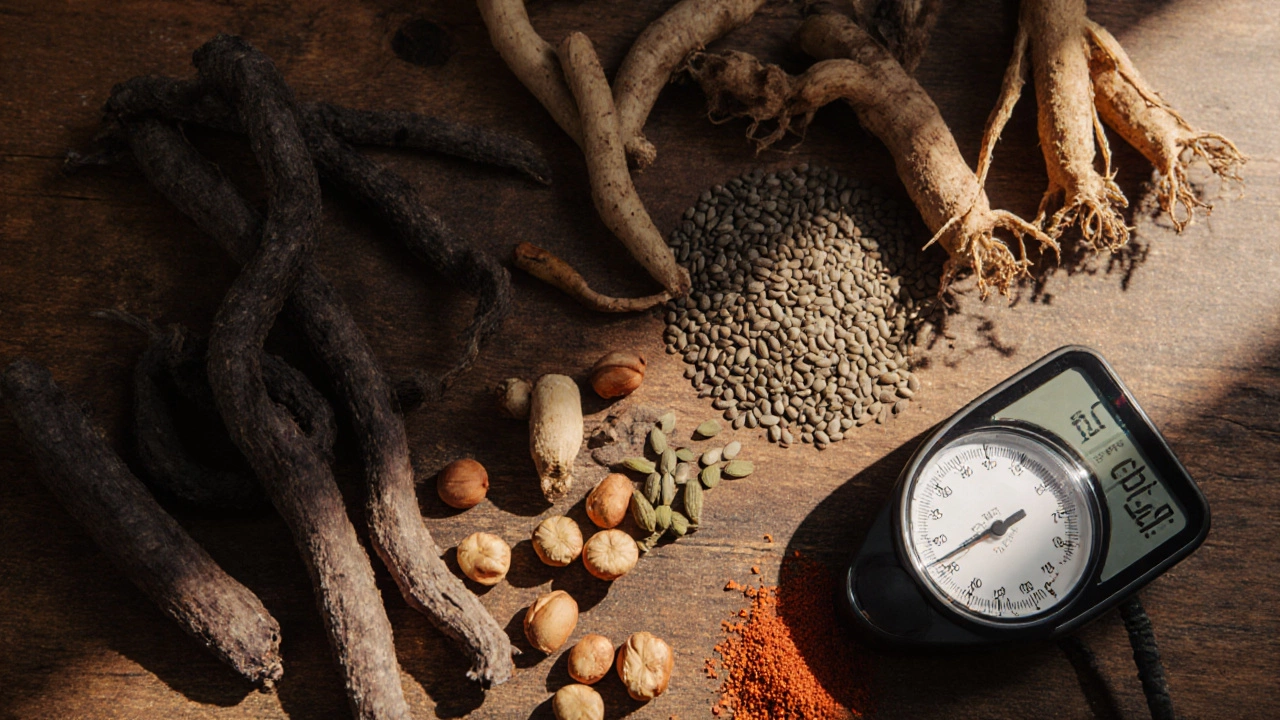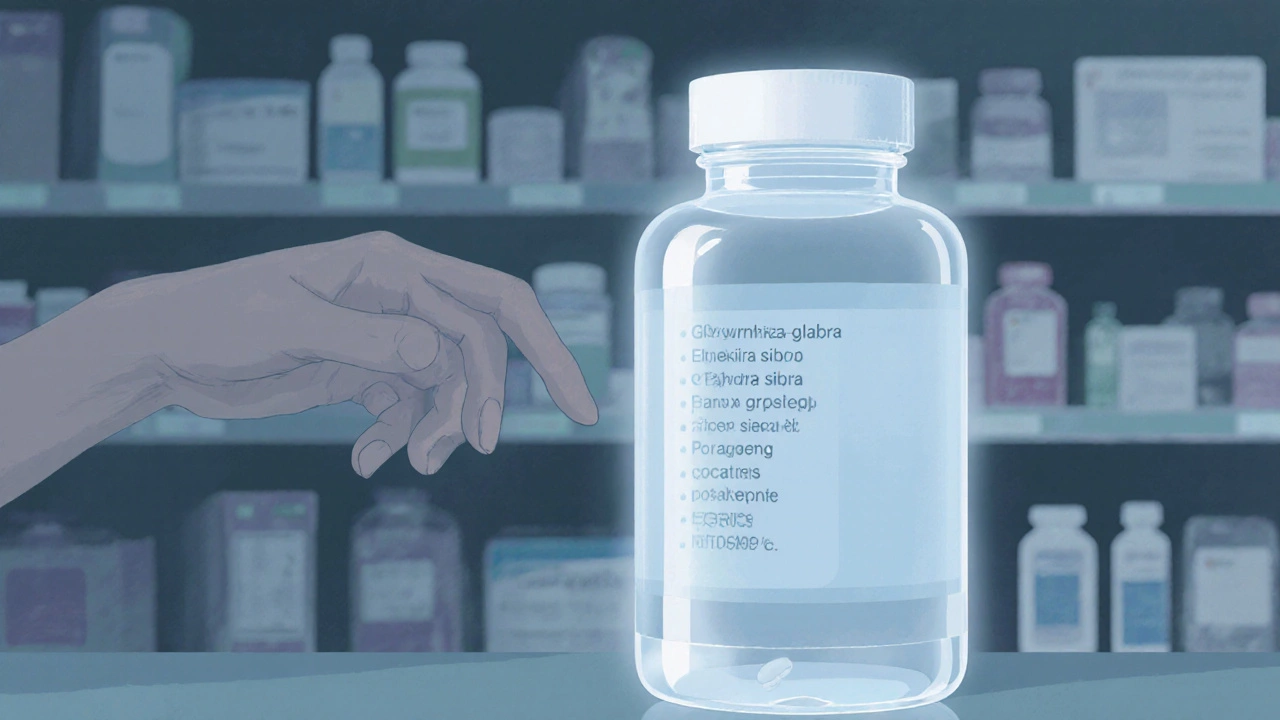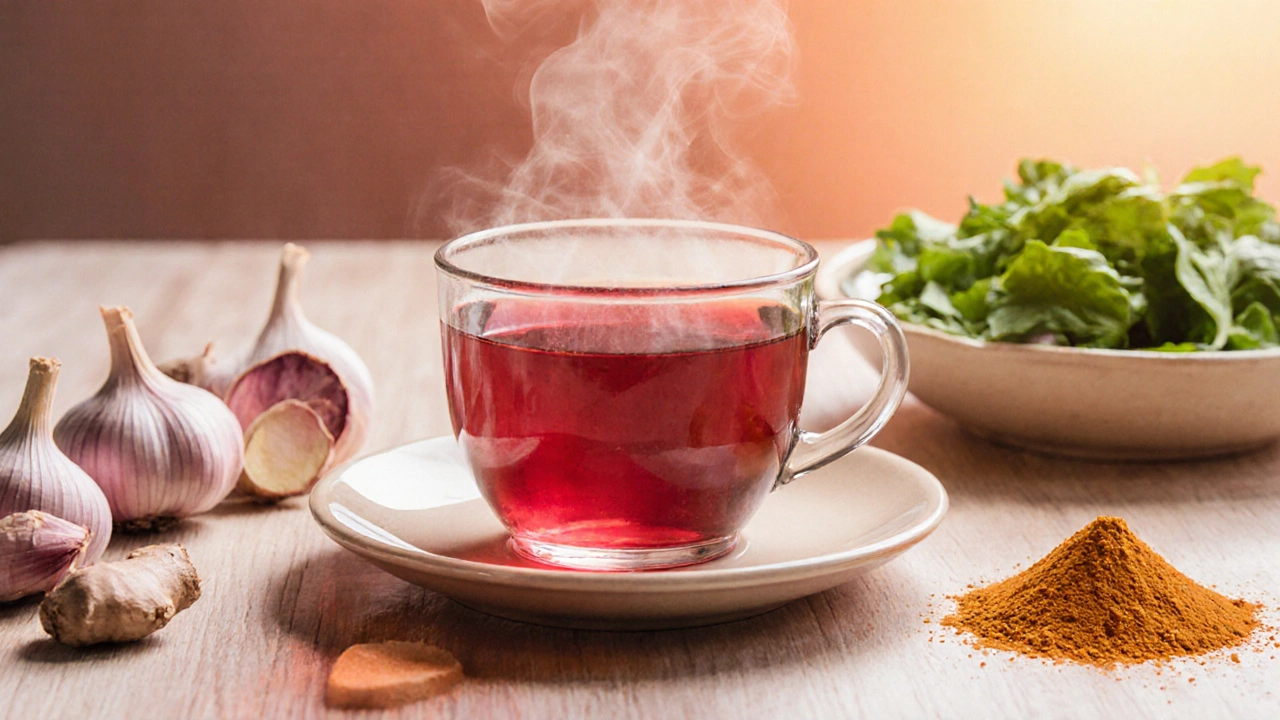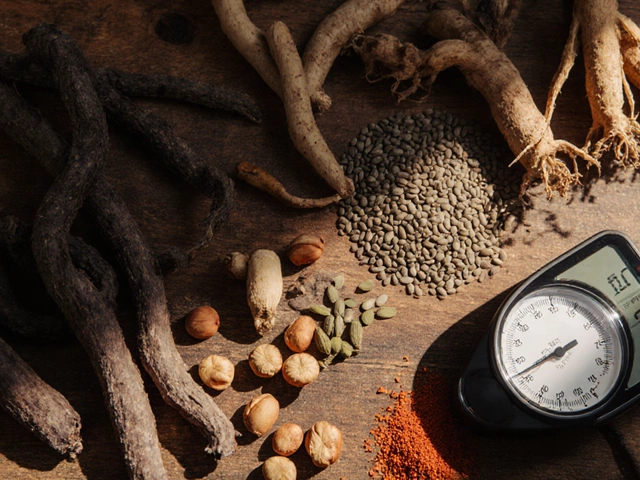- Home
- Herbal Medicine
- Herbs That Raise Blood Pressure: Risks, Signs, and Safe Alternatives

Herbs That Raise Blood Pressure: Risks, Signs, and Safe Alternatives
Herb Blood Pressure Checker
Check if This Herb Raises Blood Pressure
Select a common herb below to see if it can raise your blood pressure and what to do instead.
Select an herb above and click "Check Herb Effects" to see its impact on blood pressure.
Important Notes:
- Some herbs can raise blood pressure when consumed regularly or in large amounts.
- Always consult your healthcare provider before starting new herbal supplements.
- Safe alternatives include hibiscus, garlic, and ginger for energy and wellness benefits.
When it comes to managing hypertension, most people think about salt, stress, and medication. Few realize that everyday herbs can also push systolic numbers higher. Understanding which botanical ingredients can raise blood pressure helps you avoid unwanted spikes and keep your heart in a safer zone.
Key Takeaways
- Licorice, ephedra, and certain caffeinated herbs are the most common culprits.
- Watch supplement labels for hidden sources of these herbs.
- If you need to stay hypertensive‑friendly, choose herbs like hibiscus, garlic, or ginger instead.
Herbs that increase blood pressure are botanicals that contain compounds capable of narrowing blood vessels, stimulating the heart, or altering hormone balances that regulate fluid retention. These effects can be mild in occasional use but become significant when consumed daily or in high doses.
Why Some Herbs Spike Blood Pressure
Most herbs act on the body through bioactive molecules such as alkaloids, glycyrrhizin, or sympathomimetic agents. When these compounds interact with the sympathetic nervous system, they trigger vasoconstriction (narrowing of arteries) or increase cardiac output. Some also affect the renin‑angiotensin‑aldosterone system, causing the kidneys to retain sodium and water, which adds volume to the bloodstream.
For example, licorice contains glycyrrhizin, a sugar that mimics aldosterone, leading to potassium loss and sodium retention. Ephedra supplies ephedrine, a direct stimulant that raises heart rate and constricts vessels. Understanding the pathway makes it easier to spot risky herbs on a label.

Common Herbs Known to Raise Blood Pressure
The following list covers the most frequently cited herbs, their typical dosages that may cause hypertension, and the primary mechanism behind the rise.
| Herb | Usual Hypertensive Dose | Mechanism |
|---|---|---|
| Licorice (Glycyrrhiza glabra) | 30‑100g of raw root per day (or >2mg glycyrrhizin) | Inhibits 11β‑HSD2 → mimics aldosterone → sodium retention |
| Ephedra (MaHuang) | 0.5‑2g of dried herb daily | Ephedrine stimulates α/β‑adrenergic receptors → vasoconstriction |
| Panax Ginseng | 200‑400mg extract (>5% ginsenosides) per day | Ginsenosides increase catecholamine release → higher heart rate |
| Yohimbine (from Yohimbe bark) | 5‑15mg per day | α2‑adrenergic antagonist → sympathetic surge |
| Caffeine‑rich Herbs (Guarana, Mate) | 200‑400mg caffeine equivalent daily | Pyridine alkaloid blocks adenosine → vasoconstriction |
| Betel Nut (Areca catechu) | 1‑2nuts per day | Arecoline stimulates muscarinic receptors → transient BP rise |
| Cayenne Pepper (Capsicum annuum) | 2‑5g powdered pepper daily | Capsaicin triggers catecholamine release → short‑term spike |
| Ginkgo Biloba | 240‑360mg extract per day | Improves blood flow but can increase systolic pressure in sensitive individuals |
Spotting Risky Herbs in Everyday Products
Herbal teas, energy drinks, and “natural” weight‑loss supplements often hide these ingredients under marketing terms. Look out for:
- “Licorice extract” or “glycyrrhizin” on the label.
- “MaHuang”, “Ephedrine alkaloids”, or “Ephedra sinica”.
- “Panax ginseng”, “American ginseng”, or “Ginseng root” in energy blends.
- “Yohimbe bark” or “yohimbine HCl”.
- High‑caffeine claims such as “equivalent to 3 cups of coffee”.
Even multi‑herb formulas can combine two or more of these, amplifying the effect. When in doubt, search the ingredient list for the scientific name; common names can be misleading.
Managing Blood Pressure If You’ve Been Consuming These Herbs
If you suspect an herb is pushing your numbers up, take these steps:
- Stop the suspected herb for at least two weeks and re‑measure your blood pressure.
- Increase potassium‑rich foods (bananas, avocado, leafy greens) to counteract sodium retention.
- Stay hydrated; water helps kidneys flush excess sodium.
- If you’re on antihypertensive medication, inform your doctor. Some herbs can interact with ACE inhibitors or diuretics.
- Consider a short‑term natural blood‑pressure supporter such as hibiscus tea (shown to lower systolic pressure by 5‑7mmHg in clinical trials).
Most people see a measurable drop within a week of removal, especially if the herb was taken daily.

Safer Herbal Alternatives for Energy, Digestion, and Mood
You don’t have to give up herbal benefits altogether. Here are low‑risk options that won’t spike blood pressure:
- Hibiscus (Hibiscus sabdariffa) - tart tea that can lower systolic pressure.
- Garlic (Allium sativum) - supports vasodilation and cholesterol balance.
- Ginger (Zingiber officinale) - aids digestion without affecting BP.
- Turmeric (Curcuma longa) - anti‑inflammatory, safe for most hypertensive patients.
- Rhodiola (Rhodiola rosea) - gentle adaptogen for fatigue without major cardiovascular impact.
These herbs have been studied in peer‑reviewed journals up to 2024, confirming neutral or modestly beneficial blood‑pressure profiles.
Quick Checklist: Keep Your Blood Pressure Herb‑Friendly
- Read labels; know the scientific names of risky herbs.
- Limit daily intake of licorice to <2g raw root or avoid if you have hypertension.
- Avoid supplements that combine ephedra, yohimbine, and high‑caffeine extracts.
- Replace caffeine bursts with green tea (caffeine <30mg per cup) or herbal adaptogens.
- Track your BP weekly after any herbal change; note trends.
Frequently Asked Questions
Can a small amount of licorice still affect blood pressure?
Yes. Even 10g of raw licorice root can raise systolic pressure by 5‑10mmHg in people who are salt‑sensitive. The effect is dose‑dependent, so moderation is key.
Is ginseng safe for anyone with high blood pressure?
Occasional low‑dose ginseng (under 100mg extract) is generally safe, but regular therapeutic doses can increase heart rate and BP. If you have uncontrolled hypertension, skip it or consult your doctor.
Do herbal teas contain hidden hypertensive herbs?
Some commercial blends market “energy” or “detox” benefits and add guarana, yerba mate, or even powdered ephedra. Always check the ingredient panel; many boutique teas list the botanical names.
Can I still use cinnamon if I have high blood pressure?
Cinnamon in culinary amounts (under 1tsp per day) does not raise BP. Some studies even suggest a modest reduction, but high doses of cassia cinnamon can contain coumarin, which affects liver function-not blood pressure.
What should I do if I experience a sudden spike after using an herb?
Stop the herb immediately, sit down, and drink water. If systolic pressure exceeds 180mmHg or you feel chest pain, seek medical attention right away. Document the product name for future reference.
Being herb‑savvy lets you enjoy nature’s benefits without compromising heart health. Keep an eye on labels, know the mechanisms, and swap risky botanicals for proven, blood‑pressure‑friendly alternatives.

Arnav Singh
I am a health expert with a focus on medicine-related topics in India. My work involves researching and writing articles that aim to inform and educate readers about health and wellness practices. I enjoy exploring the intersections of traditional and modern medicine and how they impact healthcare in the Indian context. Writing for various health magazines and platforms allows me to share my insights with a wider audience.
Popular Articles
About
Medical Resource Center India is a comprehensive online platform dedicated to providing reliable health information and medical resources in India. Explore a wide range of articles, tips, and advice on medicine, healthcare services, and wellness. Stay informed about the latest developments in Indian medicine and access valuable insights into maintaining a healthy lifestyle. Discover expert guidance and health solutions tailored for every Indian citizen. Your go-to destination for authoritative medical knowledge in India.






